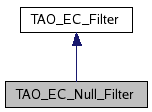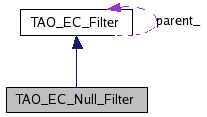
#include <EC_Filter.h>
Inheritance diagram for TAO_EC_Null_Filter:


Public Member Functions | |
| TAO_EC_Null_Filter (void) | |
| Constructor. | |
| virtual int | filter (const RtecEventComm::EventSet &event, TAO_EC_QOS_Info &qos_info) |
| virtual int | filter_nocopy (RtecEventComm::EventSet &event, TAO_EC_QOS_Info &qos_info) |
| virtual void | push (const RtecEventComm::EventSet &event, TAO_EC_QOS_Info &qos_info) |
| virtual void | push_nocopy (RtecEventComm::EventSet &event, TAO_EC_QOS_Info &qos_info) |
| virtual void | clear (void) |
| virtual CORBA::ULong | max_event_size (void) const |
| Returns the maximum size of the events pushed by this filter. | |
| virtual int | can_match (const RtecEventComm::EventHeader &header) const |
| virtual int | add_dependencies (const RtecEventComm::EventHeader &header, const TAO_EC_QOS_Info &qos_info) |
This filter accepts any kind of event, it is useful for the implementation: a) Consumers that accept all events b) Consumers that trust the filtering done at the Supplier layer. c) Event Channels that don't do filtering (such as CosEC backends)
| ACE_INLINE TAO_EC_Null_Filter::TAO_EC_Null_Filter | ( | void | ) |
Constructor.
| int TAO_EC_Null_Filter::add_dependencies | ( | const RtecEventComm::EventHeader & | header, | |
| const TAO_EC_QOS_Info & | qos_info | |||
| ) | [virtual] |
This is used for computing the scheduling dependencies:
Leaf filters check if the header could be matched, similar to the can_match() method; if it does they return 1, and 0 otherwise. Intermediate nodes always return 0.
This is used to build precise dependencies between the suppliers and the leaf of the filters that accept that event. Notice that only the nodes doing scheduling recurse through the list, so in configurations that do no require scheduling the recursion stops fairly soon.
Implements TAO_EC_Filter.
| int TAO_EC_Null_Filter::can_match | ( | const RtecEventComm::EventHeader & | header | ) | const [virtual] |
Returns 0 if an event with that header could never be accepted. This can used by the suppliers to filter out consumers that couldn't possibly be interested in their events. The rt_info and
Implements TAO_EC_Filter.
| void TAO_EC_Null_Filter::clear | ( | void | ) | [virtual] |
Clear any saved state, must reset and assume no events have been received.
Implements TAO_EC_Filter.
| int TAO_EC_Null_Filter::filter | ( | const RtecEventComm::EventSet & | event, | |
| TAO_EC_QOS_Info & | qos_info | |||
| ) | [virtual] |
Filter this event, returns 1 if the event is accepted, 0 otherwise. Notice that there are two versions of the method, if the event is not const then filter can take ownership of the event.
Implements TAO_EC_Filter.
| int TAO_EC_Null_Filter::filter_nocopy | ( | RtecEventComm::EventSet & | event, | |
| TAO_EC_QOS_Info & | qos_info | |||
| ) | [virtual] |
Implements TAO_EC_Filter.
| CORBA::ULong TAO_EC_Null_Filter::max_event_size | ( | void | ) | const [virtual] |
| void TAO_EC_Null_Filter::push | ( | const RtecEventComm::EventSet & | event, | |
| TAO_EC_QOS_Info & | qos_info | |||
| ) | [virtual] |
This is called by the children when they accept an event and which to pass it up. Notice that there are two versions of the method, if the event is not const then filter can take ownership of the event.
Implements TAO_EC_Filter.
| void TAO_EC_Null_Filter::push_nocopy | ( | RtecEventComm::EventSet & | event, | |
| TAO_EC_QOS_Info & | qos_info | |||
| ) | [virtual] |
Implements TAO_EC_Filter.
 1.4.7-1
1.4.7-1